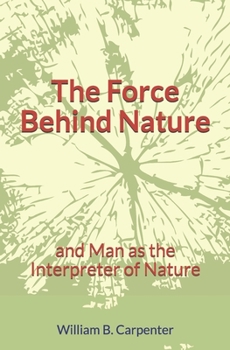The Force Behind Nature: and Man as the Interpreter of Nature
This book deals with the Force behind the nature and the study of Man as the Interpreter of Nature. We are accustomed to speak of the scientific achievements as triumphs of the human intellect. But the very phrase implies that the work is done by mental agency, and the coincidence of its results with the facts of observation is far from proving the intellectual process to have been correct. For we learn, from the confessions of Kepler, that he was led to the discovery of the elliptic orbit of Mars by a series of happy accidents, which turned his erroneous guesses into the right direction; and to that of the passage of the radius vector over equal areas in equal times by the motion of a whirling force emanating from the sun, which we now regard as an entirely wrong conception of the cause of orbital revolution. It should always be remembered, moreover, that the Ptolemaic system of astronomy, with all its cumbrous ideal mechanism, did intellectually represent all that the astronomer, prior to the invention of the telescope, could see from his stand-point the earth with an accuracy which was proved by the fulfillment of his anticipations. And in that last and most memorable prediction, which has given an imperishable fame to our two illustrious contemporaries, the inadequacy of the basis afforded by actual observation of the perturbations of Uranus required that it should be supplemented by an assumption of the probable distance of the disturbing planet beyond, which has been shown by subsequent observation to have been only an approximation to the truth. ... Though It is with the intellectual representation of Nature which we call science that we are primarily concerned, it will not be without its use to cast a glance in the first instance at the other two principal characters under which man acts as her interpreter-those, namely, of the artist and of the poet. The artist serves as the interpreter of Nature, not when he works as the mere copyist, delineating that which he sees with his bodily eyes, and which we could see as well for ourselves, but when he endeavors to awaken within us the perception of those beauties and harmonies which his own trained sense has recognized, and thus impart to us the pleasure he has himself derived from their contemplation. As no two artists agree in the original constitution and acquired habits of their minds, all look at Nature with different (mental) eyes; so that, to each, Nature is what he individually sees in her. The poet, again, serves as the interpreter of Nature, not so much when by skilful word-painting (whether in prose or verse) he calls up before our mental vision the picture of some actual or ideal scene, however beautiful, as when, by rendering into appropriate forms those deeper impressions made by the Nature around him on the moral and emotional part of his own nature, he transfers these impressions to the corresponding part of ours. For it is the attribute of the true poet to penetrate the secret of those mysterious influences which we all unknowingly experience; and, having discovered this to himself, to bring others, by the power he thus wields, into the like sympathetic relation with Nature, evoking with skilful touch the varied response of the Soul's finest chords, heightening its joys, assuaging its griefs, and elevating its aspirations. While, then, the artist aims to picture what he sees in Nature, it is the object of the poet to represent what he feels in Nature; and to each true poet Nature is what he individually finds in her...
Format:Paperback
Language:English
ISBN:2366599315
ISBN13:9782366599312
Release Date:April 2020
Publisher:LM Publishers
Length:114 Pages
Weight:0.30 lbs.
Dimensions:0.3" x 5.2" x 8.0"
Related Subjects
NatureCustomer Reviews
0 rating





